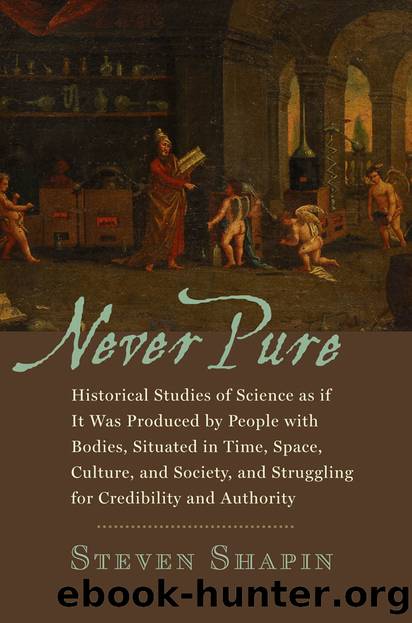Never Pure by Steven Shapin

Author:Steven Shapin [SHAPIN, STEVEN]
Language: eng
Format: epub
Publisher: Johns Hopkins University Press
Published: 2010-10-15T00:00:00+00:00
PART V
The World of Science and the World of Common Sense
Adistinguished scientist has recently asserted, with serene confidence, that the very idea of science is opposed to that of common sense: if something fits with common sense, he says, then it just isnât science, and thatâs one way you can tell what is science and what is not. This sort of claim has a long history: one of the characteristic gestures of the Scientific Revolution was the assertion that the ultimate physical and causal structure of the world was inaccessible to common experience and common modes of accounting, while emergent notions of a special and powerful Scientific Method juxtaposed that method to the faulty reasoning of the common people. Science was one thing; the Errors of the People were quite another. That sentiment is pervasive, and it is, therefore, an object worthy of serious historical attention, even if few scholars see the need to spell out what is to be taken as common sense and what as science. How did it happen that scientific knowledge was set in opposition to lay knowledge? With what consequences for conceptions of reliable knowledge and the roles of those possessing it? Who could have that reliable knowledge and how could one recognize its authentic possession? Could, indeed, the distinction between science and common sense be rejected? A historical study of proverbsâshort linguistic genres circulating among the common peopleâis one way of thinking seriously about the science/common sense distinction. What are proverbs, and how do their generalizations and applications compare to those of expert science? Another way of putting some new historical life in the science/common sense distinction is to take a close look at practices in which scientific expertiseâabstract and fundamental knowledge of natureâs processesâis brought to bear upon specifics, in the example of medicine, particular sick and suffering bodies. Is it, as Galileoâs Simplicio critically suggested, that the abstract lives in the ideal world and the concrete in the real world? If so, medicineâin its aspects as science and artâis a perspicuous site in which we might concretely address the relations between scientific expertise and whatever counts as common sense, once again transforming resource into historical topic.
Download
This site does not store any files on its server. We only index and link to content provided by other sites. Please contact the content providers to delete copyright contents if any and email us, we'll remove relevant links or contents immediately.
Bad Pharma by Ben Goldacre(3355)
How To by Randall Munroe(3033)
The Book of Numbers by Peter Bentley(2909)
Aliens by Jim Al-Khalili(2787)
A Short History of Nearly Everything by Bryson Bill(2629)
The Meaning of it All by Richard Feynman(2300)
Bill Bryson by A short history of nearly everything(1679)
A Short History of Nearly Everything: Special Illustrated Edition by Bill Bryson(1633)
Elephants on Acid by Boese Alex(1565)
Six Easy Pieces by Richard P. Feynman(1491)
Everything in Its Place by Oliver Sacks(1444)
The Meaning Of It All by Richard P. Feynman(1423)
Glukhovsky, Dmitry - Metro 2033 by Glukhovsky Dmitry(1311)
Bad Science by Ben Goldacre(1297)
When Einstein Walked with Gödel by Jim Holt(1268)
One Two Three ... Infinity: Facts and Speculations of Science by George Gamow(1218)
The American Scene by Henry James(1213)
Leviathan Wakes by James S.A. Corey(1191)
A SHORT HISTORY OF NEARLY EVERYTHING by bryson bill(1186)
